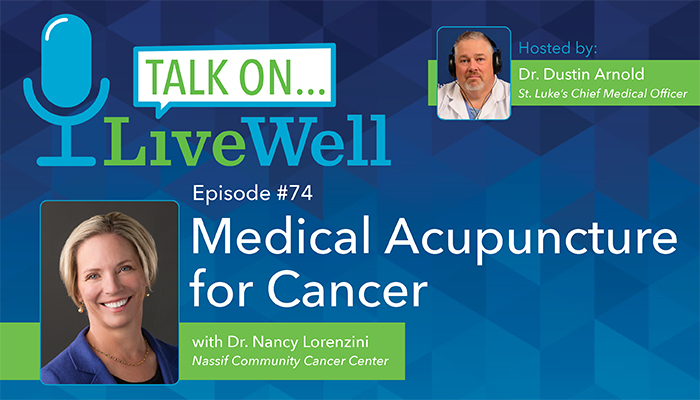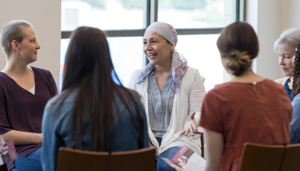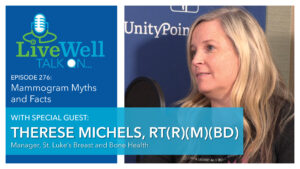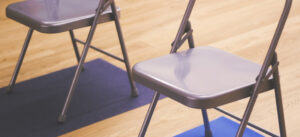Dr. Nancy Lorenzini, Medical Acupuncturist at the Helen G. Nassif Community Cancer Center, joins Dr. Arnold to discuss acupuncture and how it can benefit cancer patients.
Subscribe on: Apple Podcasts | Google Podcasts | Spotify | iHeart Radio | Pandora | SoundCloud | Stitcher | TuneIn
Host
Dr. Dustin Arnold
Chief Medical Officer
UnityPoint Health – St. Luke’s Hospital
Guests:
Nancy Lorenzini
Medical Acupuncturist
Helen G. Nassif Community Cancer Center
Transcript
Dr. Arnold: This is LiveWell Talk On…Medical Acupuncture for Cancer. I’m Dr. Dustin Arnold, Chief Medical Officer at UnityPoint Health-St. Luke’s Hospital. Cancer treatment can lead to many unwanted side effects for patients. One approach that some patients have used is to minimize those side effects during cancer treatment with medical acupuncture. Which is available through the Helen G. Nassif Community Cancer Center Integrative Wellness Program. Joining me today to talk more about this is Dr. Nancy Lorenzini, medical acupuncturist at Community Cancer Center. Welcome.
Dr. Lorenzini: Thank you, glad to be here.
Dr. Arnold: So let’s start off with what is acupuncture? How does that compare to trigger point injections, dry needling? Just kind of set the stage for what is acupuncture.
Dr. Lorenzini: Specifically acupuncture is a technique of insertion and manipulation of fine needles that are put in specific points on the body to achieve a therapeutic response hopefully. And it’s based on the idea that living beings have an inner energy, which is called qi. It’s spelled qi, it’s pronounced chee. And it’s this flow of this energy that sustains people in a balanced situation of which you may have heard things called yin and yang. So balanced qi is vital to optimal health. Illnesses and disease are caused by the interruption in this flow of qi. So in acupuncture itself, I treat the patient from a holistic point of view. So I look at their lifestyle, their diet, their stress, their work. Especially in a cancer patient their energy and particularly their anxiety. And I tailor my treatments if it’s not towards a specific complaint like peripheral neuropathy. I will tailor it to decreasing their stress, decreasing their anxiety, promoting a balance within them. This is different from trigger point injections, which I can treat with acupuncture. But like for example, our anesthesiologists who do pain and do trigger point injections, they’re taking a specific like knot of inflammation or like especially along the trapezius. Which we call gallbladder 21 and they try to with injections, decrease the pain in that nodule. That’s not my objective at the Wellness Center with acupuncture. And I also do not do dry needling, which is the insertion of needles into muscle planes to again decrease either a muscle spasm and it’s sort of a very vigorous manipulation. My manipulation is as I would say gentler. That’s the main difference.
Dr. Arnold: Okay. Well, I mean we’ve learned the literature as far as like dry needling and trigger points. It’s kind of a control alt delete for whatever area you’re injecting. And maybe it’s the mechanical phenomenon there. But if I get acupuncture, I think people have an intrinsic fear of needles, which they should. I always like the patient that tells me they’re afraid of needles and they are covered with tattoos and have all these piercings. That’s just a poster child for irony. But can I bleed from an acupuncture needle during a treatment?
Dr. Lorenzini: Absolutely. The most common side effect of acupuncture treatment would be mild bleeding. It’s always at the removal of the needle. It could have some bruising, it could have some mild soreness. Those are the most common. And I always tell patients that ahead of time. And especially if someone is on blood thinners that does not exclude that they can’t have acupuncture. They can still have acupuncture, but I’m just going to let them know they may bruise more easily.
Dr. Arnold: Okay. And the needles used are obviously sterile. So there is no risk of infection or HIV.
Dr. Lorenzini: Yeah, they’re stainless steel needles. They’re not cutting needles like hypodermics which draw blood. So they’re very fine needle point and some of them are even thinner than a strand of hair.
Dr. Arnold: Wow. And I can’t get coronavirus from it?
Dr. Lorenzini: No, you can’t.
Dr. Arnold: That’s good to know.
Dr. Lorenzini: They’re all sterile, one time use.
Dr. Arnold: Okay. And it doesn’t go deep enough to cause a punctured lung?
Dr. Lorenzini: It can, I mean that’s why you want to be treated by someone who’s adequately trained in placing the needle. So that they’re aware of where they should and should not put them and the depth that at what they put them. Because some of the needles can go a half an inch deep. Some I might insert a little bit further to achieve a sensation which I look for. Which is called qi, where I feel the tissue actually grab the needle, then I know I’m in the correct plane.
Dr. Arnold: That’s fascinating. I know myself, being a diabetic and taking insulin that sometimes you put the insulin in and you feel nothing. And other days it’s like you hit this pass in your gland and it really hurts, you know? And so I can imagine that the fine needle does trigger a response from the patient. That’s so easy for me to understand.
Dr. Lorenzini: It does and occasionally, like there’s one point which I use commonly for nausea, which is called pericardium six. It lies just above the radial nerve. So I’ll warn a patient that you may feel a little bit of a tingle into your hands. If you do, just let me know. It’s not a negative sign. So you can irritate temporarily a nerve if you get close to one.
Dr. Arnold: Sure, okay. Well that’s fascinating. So how exactly do you use acupuncture for cancer patients? How does it help them?
Dr. Lorenzini: Okay. So there’s four or five treatments which I kind of support and have used through the use of clinical studies. Like at Sloan Memorial Kettering, those kinds of places. And there are four or five that I concentrate on. For instance, I’m involved in a clinical study right now for dry mouth or xerostomia. Particularly with patients that have had radiation to their salivary glands. And in that study we’re using sham acupuncture as well as true acupuncture. And the patients are randomized, I am the only one that knows. The patient doesn’t know. And I provide them with an acupuncture treatment, two treatments every week for four weeks. And then they’re allowed to come back after two months to receive three more free treatments. And that study should be coming out. We’re one of the top participants. It’s from Wake Forest. So that’s one thing I do. And we also can see patients who just don’t have to be part of that study. They can come in just for dry mouth as well. Nausea, vomiting is the other one that’s very common. And that was one of the earlier treatments in medical acupuncture. The studies were done in the 90s that showed improvement with patients who were pre-treated prior to chemotherapy with acupuncture points for nausea and vomiting. And it showed to really decrease the incidence of that. The other is peripheral neuropathy, which is probably one of the most common treatments that I provide at the Wellness Center. Chemotherapy induced peripheral neuropathy is a life changer for people. They lose their balance, they can’t button their shirts, they can’t use the computer. So we’ve got a nice protocol set up at the Wellness Center where patients can come in and get some treatments. And it’s supplemented through the foundation, which is really helpful for patients that can’t afford it. And it’s actually worked out really well. It’s really improved the quality of life for these patients and they are able to walk better. And it gives them a sense of empowerment that, you know, they’ve gone through all this and now they still have these side effects. I love to see those people get better and they do.
Dr. Arnold: Yeah. Some of the chemotherapy can cause a permanent neuropathy, not just transient.
Dr. Lorenzini: Yes it can.
Dr. Arnold: You mentioned the frequency. So if a patient had the need for acupuncture or a diagnose required it. Let’s say with the nausea, vomiting, how often would I be treated?
Dr. Lorenzini: I tell patients if they’re going in for the chemotherapy treatments and they want me to see them prior to that, we’ll arrange for that. So that’s on an as needed basis. If someone has, we didn’t touch on this yet, but a lot of what I treat for is, which I would like to treat more of is insomnia and anxiety. Because it’s actually beautiful for that sort of situation, especially in a cancer patient and a cancer survivor. Because the cancer survivor patient is still always in the back of their mind wondering when or if this is going to return and how again it will change their life. And so I’ll encourage those patients to come initially for one treatment a week for maybe three or four sessions. Because these sessions can build upon each other. One session usually can provide some profound relief. But I encourage them to come back for three or four just to kind of help them. Help it build upon them and get them more comfortable with the acupuncture itself.
Dr. Arnold: Okay. We were talking about cancer patients and certainly we’re very proud of the Community Cancer Center. All the services they offer. But if somebody is listening and say well, you know, I have chronic insomnia. Would acupuncture work on them too?
Dr. Lorenzini: Yes. In conjunction, when I see patients like that, because I also have another little clinic where I see private patients. I don’t take them off any medications. I let them let that happen between them and their PCP because I think that if they can get a great night’s sleep after one treatment, it might encourage them to return to their family doctor and say hey can we cut back on these benzos? Or can we get rid of the gabapentin I’ve been on for my peripheral neuropathy? Can we cut back? So yeah, it works.
Dr. Arnold: You know, insomnia is one of those conditions or non restorative sleep. That medication, I always tell patients, it’s kind of like your car is making a noise and you’re just turning the radio up louder. There’s an underlying problem that you need to be addressing, not just throwing medication at it. So that’s wonderful that acupuncture could compliment that. I know you’re anesthesiology by training and I know you’re a patient advocate, but what got you interested in acupuncture?
Dr. Lorenzini: Well I myself have had a lot of surgery. I had a quite debilitating ski accident when I was 42. And it kind of changed my life because I had chronic pain. I understood what chronic pain was after having been through that. And I sort of looked at my job as an anesthesiologist different because patients. I was afraid of surgery and I had quite a long, long surgery. And then I had all the rehab that I had to do and loss of work time and I just started using complimentary therapies. Particularly massage therapy for my recovery at about a year and a half after my accident because I was still having a lot of pain. And I was amazed at what massage therapy could do for me.
Dr. Lorenzini: I thought this is awesome and I thought this is, you know I don’t believe in any of this stuff. And then down the road I had shoulder surgery and then I went and had acupuncture because my daughter had had acupuncture as a swimmer for her shoulder. She said, you should try it. So I tried it and I found it to be very relaxing and it helped. And then along the road I just thought I was interested in these alternative forms of treatments and acupuncture kind of kept creeping into the background. And I thought maybe you should look into that. And so I did with a little more seriousness. And in 2012, I took a course which is taught by a physician who educates probably 90% of physicians in acupuncture. And it was a course over about a year. And in the process a very, very close friend of mine developed acute myelogenous leukemia. And so in her treatments and in her recovery, I began to use acupuncture to treat her nausea, her anxiety and her dry mouth. Because she had severe dry mouth from graft versus host disease and dry eyes. And I was amazed what it did for her and that was how I got involved with cancer patients and the Wellness Center. That’s sort of what triggered me to become more involved with that.
Dr. Arnold: I’m always impressed and take a lot of pride in learning. Each podcast we’ve learned more about the Cancer Center and some service they provide. It always comes back to say, wow, this is the entire spectrum continuum of care. And no stone is unturned. Nothing is left untreated. And that’s something we should be proud of. Which we are proud of. This to me, as a Western trained physician this all makes sense. Because I see, whether it’s chiropractic care, physical therapy, massage, just that act of touching. I think the five senses, sight, smell, hearing music, pleasant visually, pleasant taste, essential oils, aroma therapy. This all makes sense because it all ties together and it all ties together in a positive way. And if you can smell something that smells bad and it makes you feel ill, then you can smell something that smells good, that makes you feel better. I mean it’s so straightforward. Sometimes I’m reflecting on my career medicine that I wish I would’ve picked up on this sooner because I think it would’ve changed how I did things.
Dr. Lorenzini: I couldn’t agree more. I think I studied acupuncture stuff quite a bit. And there’s something called five element acupuncture, which is very, very interesting. And it’s based on wood, fire, earth, metal and water are the five elements. And how we’re all composed of each one of these elements. For instance, the earth person might be mother earth, she’s very caring. She’s always giving of herself. Whereas the fire person is full of life and vigor and very, just kinda crazy. And we all have a little bit of these elements, but then as we go through life, things change us. It could be the loss of a parent, a loss of a friend. It could be, a suicide, it could be just something. And we tend to become more wood or more fire. More metal for instance, would be someone who can’t let go of grief and the water person is very fearful. So that’s how I kind of try to look at patients. They do fill out this form and they always ask, why do you need to know this? I’m like, well, I just like to get the feel for maybe which one of these you tend towards. But then in the interview I can kind of surmise where they fall.
Dr. Arnold: Fascinating. Now my maxim is there’s two types of people in the world. There’s patients and nurses. I think they’re people that love to take care of other people, sometimes at the neglect of their self. And there are other people that like to be taken care of. And so that’s how I see the world. But that’s fascinating the five elements because it’s so true. The different personalities as you change, as you get older. Youth is wasted on the young or whatever the saying is. There’s so much you learn as you get older that you wish you knew then. I mean that is so true. Nancy, this is really great information. Thank you so much for taking time to talk about this. Again, this was Dr. Nancy Lorenzini, medical acupuncturist at the Helen G. Nassif Community Cancer Center. For more information on medical acupuncture for cancer and other Integrative Wellness Services provided by the Community Cancer Center and visit their website at communitycancercenter.org.







